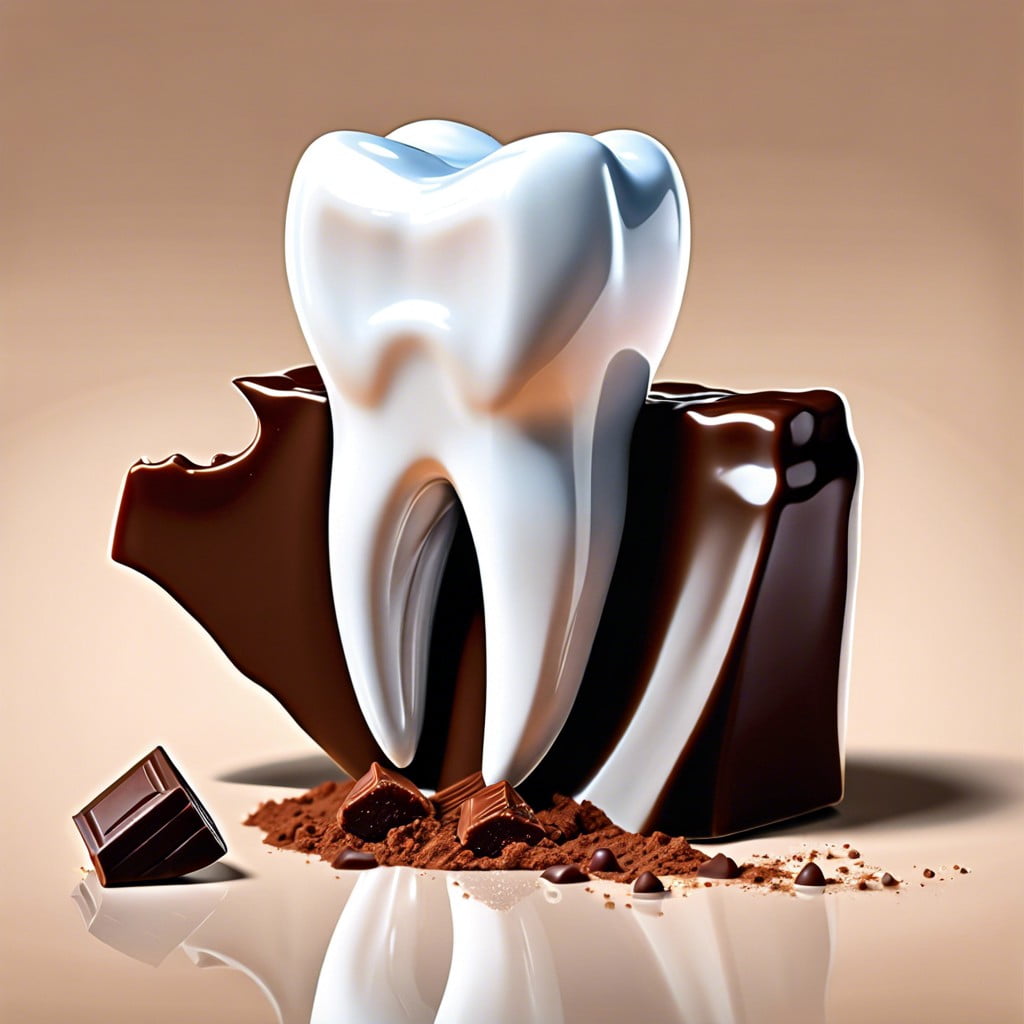Learn why chocolate can make your teeth hurt and what you can do about it.
Key takeaways:
- Cavities: Chocolate’s sugars can cause cavities and tooth pain.
- Sensitivity: Chocolate can irritate sensitive areas of the teeth.
- Temperature: Cold chocolate can cause sharp pains in sensitive teeth.
- Receding Gums: Exposed tooth roots can result in tooth pain when eating chocolate.
- Sugar Content: High sugar content can make sensitive teeth even more painful.
Inside
Quick Answer: Why Do My Teeth Hurt When I Eat Chocolate?

When your teeth feel like they’re staging a mini-protest every time you bite into a chocolate bar, there are a few likely culprits:
Cavity Clues: Chocolate’s sugars can feed bacteria in your mouth, producing acids that wear down enamel and cause cavities. That twinge could be a sign of an unwelcome guest.
Sensitive Spotlights: If your teeth have worn enamel or exposed dentin, chocolate’s ingredients can irritate those sensitive areas. It’s like touching a nerve—literally.
Temperature Tango: Sometimes it’s not the chocolate but its temperature. Cold chocolate can cause sharp pains in teeth that are already sensitive to hot and cold.
Gum Gossips: Receding gums can expose the roots of your teeth, which are more sensitive and prone to pain. Even a smooth bite of chocolate can ruffle their feathers.
Sugar Shock: High sugar content can play tricks with your oral health, making already sensitive teeth feel like they’re getting the electric chair.
Why Chocolate Can Cause Tooth Sensitivity & Pain
Chocolate’s delightful sweetness is a wolf in sheep’s clothing for your teeth. The sneaky reasons behind the discomfort might surprise you.
First, sugar is a star player. When it meets bacteria in your mouth, it throws a party, resulting in acid. This acid is a heavyweight champ at wearing down tooth enamel.
Another culprit is temperature. Cold or hot chocolate can give sensitive teeth a rude awakening, as they don’t appreciate thermal shenanigans.
Acidity in chocolate itself can’t be trusted either. Even dark chocolate, despite its virtuous reputation, has enough acidity to contribute to enamel erosion.
And then, there’s the sticky factor. Ever had chocolate hug your teeth like it never wants to let go? The longer it clings, the more time the sugar and acid have to cause mischief.
Also, don’t forget about cocoa solids. They might seem harmless, but they contain tannins, which can exacerbate tooth sensitivity.
Steps to Alleviate Pain and Prevent Future Tooth Discomfort
Opt for dark chocolate over milk chocolate. Dark chocolate has less sugar, reducing the chances of discomfort.
Brush your teeth gently with a soft-bristled toothbrush after enjoying your chocolaty treat. This helps remove any lingering sugar that can irritate your teeth.
Use toothpaste formulated for sensitive teeth. It can help build a protective barrier over your teeth and minimize pain.
Rinse your mouth with water after eating chocolate. It helps wash away sugar and acids that cling to your teeth.
Chew sugar-free gum to stimulate saliva production. Saliva is your mouth’s natural defense, neutralizing acids and sweeping away food particles. Plus, it gives you an excuse to blow bubbles like a kid again.
Visit your dentist regularly. Professional cleanings and check-ups catch potential issues before they turn into toothaches.
Avoid biting into hard chocolate. Let it melt in your mouth instead. Think of it as savoring the moment while saving your teeth.
Understanding Tooth Sensitivity
Teeth have a protective outer layer called enamel. Beneath the enamel is a sensitive layer called dentin, which is connected to the nerves inside your teeth. When enamel wears down, it exposes dentin, making your teeth more vulnerable.
Cold or sugary foods and drinks, like chocolate, can trigger sensitivity. Sometimes, tiny cracks in your teeth can also expose the nerves, setting off pain signals faster than you can say “choco-hurt!”
Common causes include:
- Brushing too hard, which can wear down enamel.
- Grinding your teeth, often in your sleep, adding to enamel erosion.
- Gum recession, which can expose tooth roots and increase sensitivity.
Tooth sensitivity might also develop from acidic foods or drinks, playing tug-of-war with your enamel. Keeping these factors in mind can help you understand why your sweet treat might come with a sour note.
Related
- Why No Chocolate After Hiatal Hernia Surgery: Dietary Restrictions Explained
- How Do All Kinds of Chocolate Stain Teeth? What to Do: A Comprehensive Guide
- Is Hot Chocolate Good for Sore Throat? – Benefits and Drawbacks Explained
- Does Chocolate Help with Period Cramps: Understanding the Effects
- Does Hot Chocolate Have Caffeine? Find Out What’s in Your Cup